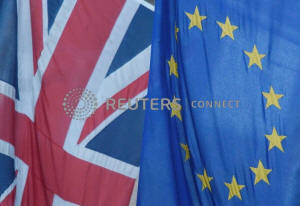Britain on collision course with EU with trade talks mandate
 Send a link to a friend
Send a link to a friend
 [February 27, 2020]
By Elizabeth Piper, Kylie MacLellan and William James [February 27, 2020]
By Elizabeth Piper, Kylie MacLellan and William James
LONDON (Reuters) - Britain unveiled a
negotiating mandate on Thursday for talks with the European Union that
puts it on a collision course with Brussels, underlining its desire for
future economic and political independence.
After officially leaving the EU last month, Britain has until the end of
the year to negotiate a trade deal and agreements on everything from
fishing to transport to replace more than 40 years of close political
and economic relations.
Having accepted that, by leaving the EU's customs union and single
market, British businesses will encounter new "frictions" in trade with
the bloc, the government has made its stance clear - self-determination
must trump economic concerns.

The two sides have until June to get what London's negotiating team
called "the broad outline of an agreement" to be finalised by September.
Otherwise, the government says Britain will head for an Australia-style
agreement, much of which runs along baseline World Trade Organization
rules.
"At the end of the transition period on the 31st of December, the United
Kingdom will fully recover its economic and political independence,"
cabinet office minister Michael Gove told parliament as he unveiled the
mandate.
"We want the best possible trading relationship with the EU, but in
pursuit of a deal we will not trade away our sovereignty."
Prime Minister Boris Johnson, the face of Britain's campaign to leave
the EU in 2016, has staked his reputation and possibly his future as
leader on "getting Brexit done", and has charged his negotiating team
with securing a clean break with the bloc.
Both sides say they want a deal to be agreed before the deadline of Dec.
31, 2020 so that trade can flow, albeit with some additional checks, and
that arrangements on issues such as aviation can roll over seamlessly.
[to top of second column]
|

A Union flag flies next to the flag of the European Union in
Westminster, London, Britain June 24, 2016. REUTERS/Toby
Melville/File Photo

But with the two sides unable to agree on even the format of talks
scheduled for Monday, the negotiations look set to be a battle of
wills. Both the British and EU teams have already accused each other
of breaking with earlier agreements.
On Tuesday, the EU said talks on post-Brexit ties would be "very
hard" and could fail if London did not secure the new land border
with the bloc on the island of Ireland in the way that Brussels said
had been agreed.
Stumbling blocks include what the EU calls its level playing field -
shorthand for agreed baseline rules on environmental standards,
labor regulations and state aid.
Brussels wants London to commit to those rules in law - but London
says that such provisions are not part of other EU trade agreements,
and that they do not fit its goal of "taking back control" from
Brussels.
Britain also says that, as an independent coastal nation, it will
not trade away its fishing rights. At the same time, it is pushing
for "legally binding" obligations on access to the European Union
market for its important financial services industry.

(Reporting by Elizabeth Piper; editing by Guy Faulconbridge and
Kevin Liffey)
[© 2020 Thomson Reuters. All rights
reserved.] Copyright 2020 Reuters. All rights reserved. This material may not be published,
broadcast, rewritten or redistributed.
Thompson Reuters is solely responsible for this content. |